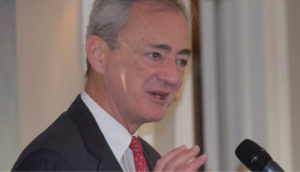People’s United observes how drama and uncertainty shapes the financial markets
This year has seen more than its fair share of upheaval, and there are still three months left to maelstrom. Bridgeport-headquartered People”™s United Advisors offered an overview of what the near-future could hold in a webinar titled “November is Coming,” which considered the effects of the pandemic on the current economy and how the presidential election will impact on the financial markets.

Michael Boardman, president of People”™s United Advisors, reminded the audience that they were still on a socioeconomic rollercoaster ride that was nowhere near ending.
“To set the stage for our discussion, let me just start by saying, ”˜Wow, what a year it’s been,”™” Boardman exclaimed. “It seems almost like ancient history, but at the start of the Covid-19 pandemic in March, the Dow dropped 35% from its peak above 29,000 to its low on March 23 of 18,500. Subsequently, and arduously. the market has almost entirely retraced that step since then. And currently, we witnessed remarkable governmental intervention ”“ both fiscal and monetary policy have been historic.”
Boardman noted addition of the November election to the ongoing tumult has created “quite a cocktail of activities that the markets are trying to absorb.” While the world is focused on the current crises, Boardman stressed the importance of “starting to think about the other side of this crisis.”
John Traynor, executive vice president and chief investment officer at People”™s United, reminded the audience that the economy and the financial markets were not strangers to chaos and uncertainty.
“It was Mark Twain said, ”˜History doesn’t repeat itself but it does rhyme,”™” he said. “So, how can we use history to understand the market that we’ve been in so far this year?”
Traynor detailed the “incredible rise in technology stocks” began in the late 1990s and has yet to abate, and the Covid-19 crisis further accelerated technology spending to enrich the high-tech sector. He cautioned that investors need to “view the valuations on a few of the largest tech stocks today cautiously,” noting that growth stocks have outperformed value stocks over the past decade and through the pandemic.
“This difference can be explained primarily by the good performance of technology stocks versus the poor performance of financial stocks,” he said. “We need to see a rebound in the economy with expanding business confidence and expanding consumer spending. We believe the economic environment is positive for the stock market going forward, especially because the Fed has told us that they’re going to keep interest rates low for the foreseeable future.
“We want to see a broadening of the market, meaning value and small cap stocks have to rise,” he added. “They’ve got to rise along with the rest of the market.”
Traynor predicted the development of a vaccine to eradicated Covid-19 could “spur our reopening of the economy, so we all get back a little bit closer to our lives before the pandemic.”
Albert Brenner, director of investment and economic research at People”™s United, considered the state of the economy “as somewhat of a patchwork quilt, with some parts doing well, other parts doing less well and struggling ”“ and that’s cutting across both geographies, industries and different working classes.” While he was hopeful for a stronger economy, Brenner admitted it was “better than many realize and certainly better than we were expecting a few months ago, and in large part, thanks to the fiscal and the monetary support that we’ve had.”
Yet Brenner noted “the economy is not just expanding, it’s evolving,” with the pandemic creating changes in business operations, education and consumer behavior. Still, Brenner warned “the second half of the recovery is going to take longer, because of the issues we have to work through will be harder than in the first half” as a result of the havoc created in the pandemic”™s economic tumult.
As for the presidential election, Traynor stated that both Trump and Biden supporters are nervous about the economy”™s direction if their candidate loses, and he advised the audience not to be agitated on this issue.
“The first thing I say is, ”˜Let’s take a deep breath, relax, and let’s not worry about the market,”™” Traynor said. “Whether the incumbent wins or the challenger wins in November, once we know who the winner is, the market tends to rally and over the next 12 months is higher. This happened in almost every election since 1933. So, we’re heading into a positive environment for the market, no matter who wins.”
As for investing based on a potential second Trump term or a new Biden administration, Traynor defined a “Trump portfolio” as being more of value portfolio, while a “Biden portfolio” was tilted towards slower-growing but more stable stocks.
Brenner cautioned that campaign promises do not always translate into policy.
“If Joe Biden wins the election, the fact that his plan is to raise corporate taxes doesn’t mean that that’s going to happen,” he said, adding that the election winner will have to deal with a Congress whose next configuration and agenda is still anyone”™s guess. Brenner cited key issues including regulation, trade, healthcare and energy as being the factors shaping the 2021 financial markets, no matter who wins on Nov. 3.
And while there were no predictions offered on which candidate would emerge victorious, Boardman diplomatically concluded the webinar by observing that “research shows that over the past 50 years or so, there have been positive market results in both Democratic and Republican administrations.”